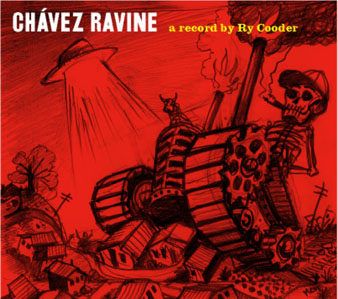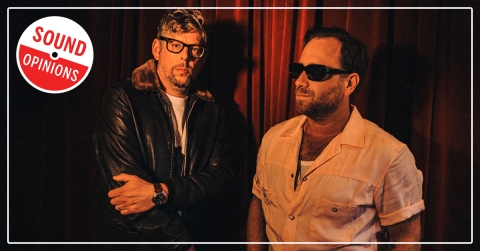As the Los Angeles Dodgers marked the 50th anniversary of Dodger Stadium this week, New York Times writer George Vecsey looks back at some of the team's more checkered moments and wonders whether there might be a curse tied to Chávez Ravine, the Mexican-American community that was destroyed in the '50s to build the stadium. It's a story Ry Cooder recounts in his 2005 album Chávez Ravine. Vecsey continues the conversation with a post on his blog in praise of that album. "It is about baseball and it is about business," Vecsey writes. "But mostly it is terrific music." Rolling Stone gives four stars to Cooder's book, Los Angeles Stories, calling it "superb."
As the Los Angeles Dodgers marked the 50th anniversary of their stadium, Dodger Stadium, this week, the New York Times writer George Vecsey recently took a look back at some of the more checkered moments of the team's history and wonders whether it might be a curse tied to the land on which the stadium was built. To make way for Dodger Stadium in the 1950s, the Mexican-American community of Chávez Ravine in Los Angeles was destroyed. "There's still a town under third base," Ry Cooder tells Vecsey in the article, which you can read at nytimes.com. It's a story Cooder and a cast of legendary Chicano musicians recount in the album Chávez Ravine, released on Nonesuch in 2005.
There was much more from George Vecsey's e-mail exchange with Ry Cooder that went beyond the scope of the New York Times article, so Vecsey expanded its reach in a piece he posted to his own blog titled "Praise for Ry Cooder and His 'Chávez Ravine.'"
"The album is in the top ten in my iPod," Vecsey writes. "It is about baseball and it is about business. But mostly it is terrific music."
He goes on to describe it this way: "The Chávez Ravine album hits hard at the machinations that put the peripatetic Dodgers, former of Flatbush, Brooklyn, on a hillside overlooking LA. It incorporates sounds in Cooder’s head, and real news events and life in the mostly Latino village up on the hill, and it also contains a few artistic liberties."
Read more of Vecsey's praise and see what Cooder has to say at georgevecsey.com.
For more on Chávez Ravine and to hear clips from the album, click here.
---
In the latest issue of Rolling Stone magazine, Ry Cooder's book, Los Angeles Stories, receives four stars. The first-ever stand-alone written work from Cooder, Los Angeles Stories (published by City Lights) is a collection of loosely linked tales that evoke a bygone era in one of America's most iconic cities.
"On his records, Ry Cooder specializes in the talking blues, modernizing the struggle and humanity in his source materials—folk and public-domain covers, the rhythms of Tex-Mex and Chicano culture—with narrative grit and immediacy," writes Rolling Stone's David Fricke. "His prose, in turn, is rich in sound—echoes of blues, jazz, boleros—in this superb debut of tales set in L.A.’s ... Cooder writes with Chandler-esque pepper and an eye for character." Fricke concludes: "Cooder shouldn’t stop making records. He should keep writing, too." Read the complete review in the current issue of Rolling Stone.
To pick up a copy of Los Angeles Stories, click here.
- Log in to post comments



